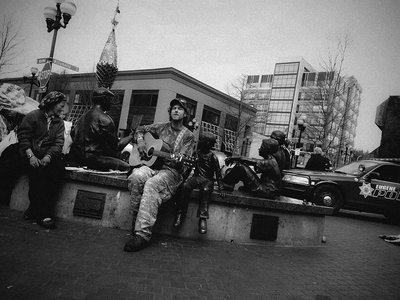
On May 27 the Eugene Police Department brought the City Council a proposal to close Kesey Square between 11 pm and 6 am, a move that some say is targeting the homeless population. Kesey Square, aka Broadway Plaza, is a city-deemed performance space that sits on the corner of Broadway and Willamette, home to the bronze statue of Ken Kesey. The City Council has not scheduled a vote.
Civil Liberties Defense Center attorney Lauren Regan says the proposal to close the public square is repugnant in the face of the human rights image touted by the city of Eugene.
“It’s incredibly classist and discriminatory based on income and status, and I think we gave up those types of policies 100-plus years ago,” Regan says.
Homeless rights advocate Alley Valkyrie says there is already a lack of public space for the unhoused downtown.
“What downtown Eugene needs are bathrooms, benches and more open spaces,” Valkyrie says.
She says the ordinance changes will stir more resentment between businesses and the transient population. “The only reason they’re there in the first place is because after park curfew there’s nowhere else legal for them to be, and now we’re going to kick them out of the last place that they’re allowed to be,” Valkyrie says. “Where are they supposed to go?”
Police Chief Pete Kerns says the businesses near the public plaza want it closed at night. He says food cart equipment is often broken and stolen.
“Anyone who walks across the plaza won’t be — it doesn’t affect them,” Kerns says. “It’s the people that want to park there and get in fights and drink and camp there overnight.”
Tom Kamis, owner of The Davis on the corner of Broadway and Olive, estimates that a large fight happens once a week outside of his restaurant. “The fighting, I think, is going on a lot more in back alleys,” Kamis says.
Valkyrie says she noticed more problems coming from the college-age crowd than the unhoused when she was living on 10th Avenue and Lincoln Street. She says she believes the police largely ignore their behavior because they spend money downtown.
“Public space is public,” Valkyrie says. “We should not be excusing the behavior that comes from people who spend money and then scapegoating those who have no money.”
Regan says enforcing this ordinance would cost taxpayers money and ensure that police will continue to get the largest chunk of the city’s municipal budget.
“People will qualify for court-appointed lawyers based on the fact that they have no income and there are no other places for them to seek shelter in Eugene,” Regan says.
Citations for being in Kesey Square between 11 pm and 6 am could amount in fines as high as $500 on the first offense and $1,000 and one year in jail for subsequent violations. Kerns says he expects the council to take action on the ordinance by the end of June.
The proposal also prohibits unlicensed dogs from the downtown activity zone, which covers the area between Sixth and 11th avenues and High and Lincoln streets.
“Neither proposal addresses the sources of homelessness or contributes to a solution,” Eugene Human Rights Commission member Ken Neubeck says. “Carrying these proposals out will utilize staff time and financial resources that could be far better used by police in the prevention and pursuit of more serious crimes perpetrated on the housed and unhoused.”